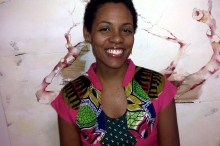
 Kristen Hayes is being honored as a Champion of Change for her efforts in school turnaround.
Kristen Hayes is being honored as a Champion of Change for her efforts in school turnaround.
The primary motivation behind my artmaking has always been to affect the viewer in some manner: to facilitate the occurrence of a “holistic” experience, allowing participants to walk away with a broader sense of the physiological impact of all art forms. When you are completely surrounded by a visual stimulant, you are undeniably affected in some way.
As a result of working within the D.C. Public Schools system as an art educator, I have witnessed the benefits of educating the “whole” child, where the elements of art, particularly color, are integrated as tools for higher learning. “Color Is Life” is one approach to connecting the arts to the development of the whole child.
Several studies have proven the emotional, mental, and physical influences that bold colors have on academic environments. These settings are immediately transformed into places that are emotive in nature, facilitating a higher educational experience. Because colors feel innately “good”—the energy is positive and welcoming and the students are made to feel happier – it becomes easier and more enjoyable for students to focus and comprehend. Strategically planned color schemes have been proven to facilitate improvements in test scores, reducing absenteeism for students and faculty and increasing unity among peers. Color celebrates diversity and promotes a greater sense of security for students.
Unfortunately, you will typically find public school walls in urban areas filled with dull and very muted color paint, exhibiting more of an institutional feel, rather than one of excitement and invitation. As the majority of these students’ time is being spent at school, it is crucial that they are surrounded not only by positive people, but an uplifting environment as well.
I am fortunate enough to have found a principal, Mr. Patrick Pope of A. Kriger Savoy Elementary School, who was more than willing to adopt my endeavor, “Color Is Life,” and incorporate the concept of color transformation into his school. Savoy is located in the southeast neighborhood of Anacostia, an area in which you will find beautiful landscapes and a rich history of African and Native American culture. Through “Color Is Life,” Savoy students have explored the more functional role that color plays in different cultures, in addition to being given an opportunity to better understand the critical thinking process of color theory and analyzing how pairings of certain colors create an area that is pleasing to the senses. The goals of the initiative are not only to provide under-served spaces with stimulating color combinations that enhance learning, but also to educate the students and faculty on the therapeutic power of color transformation, the cultural relevance of the colors being used (with the addition of Native-American and African textile-inspired murals on the walls), and the value of creative thinking.
Currently, “Color Is Life” has also expanded to another southeast public school, Ballou Senior High School, where the aspiration is to lift the spirits and morale of all who enter the school and to be a catalyst for higher achievement for the students this coming school year. With this particular endeavor, we have collaborated with other community entities, including “Guerrilla Arts” and “Slickfish,” both of whom continue to foster arts-integrated programming for the youth of the D.C. area.
As a native Washingtonian and as an artist, I am certainly proud to be serving my community in this way. I will continue to work to extend my art through “Color Is Life,” being excited for those administrators and others who are receptive to the significance of color transformation in all social environments. For the sake of urban students’ future, officials of school systems should begin to exhaust every resource that will aid in the encouragement and ultimate success of our children’s education, particularly those already living in under-served communities. Color is truly a vehicle that can and has made a difference in the lives and academic achievements of the city’s students.
Kristen Hayes is an art instructor for the District of Columbia's Public School system.


